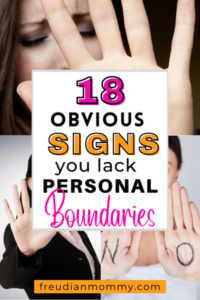Setting and modifying boundaries should be a continuous part of your life. Your boundaries hint at telltale signs of potentially unhealthy and toxic relationships that may include your involvement. And should be included in one of the first discussions in every relationship, whether friendship or romantic relationship.
People often walk around with unspoken and invisible boundaries. They expect you to know and guess what their boundaries are and become upset when you unintentionally cross them.
However, just like setting boundaries, communicating those boundaries are just as important.

What are boundaries?
Boundaries play a significant role in your life and are created for a reason. They are based on your moral and ethical beliefs and are there to protect you and your personal space. Boundaries set limitations and let people know how they can and cannot treat you.
Without boundaries, you risk people treating you in ways that are uncomfortable and offensive to you.
Boundaries are also used as indicators. They let you know whether a person respects and values you, your personal beliefs and space. When someone cares about you, they respect your boundaries and try never to cross them.
Why is it important to recognize unhealthy boundaries?
Just like it is important to recognize healthy boundaries, it is even more important to notice unhealthy boundaries. Getting involved with a person who does not have healthy boundaries can cause you a lot of heartaches. Familiarizing yourself with the many warning signs of unhealthy boundaries will help you identify and end potential harmful and toxic relationships before they even begin .
The simple fact is people with poor or no boundaries are sure to test yours and your personal space. These individuals often don’t understand the concept of limitations and continuously push you over the edge causing you to go against your boundaries.
Example of unhealthy boundaries:
Imagine meeting a new friend at the gym. After a couple of interactions, you decide to make plans to go out to dinner Thursday night. On your way to the restaurant, you let this friend know that you have to leave by 9:00 pm at the latest because you have an early meeting the next day.
When it’s time to go, the friend encourages you to “relax and live a little.” You give in and get home at 11:30 pm when you usually go to bed at 9:00 pm during the weekdays.
You and your new friend go out again the following week on a Thursday to see a movie. You once again tell your friend that you have to leave by 9:00 pm at the latest because you have an early meeting the next day.
And again, your friend further encourages you to “just chill” because “you work too hard.” You now believe that you are “too uptight and need to learn how to relax.” You get home at midnight this time, missed your 6:00 am alarm, and ended up being 15 minutes late for your very important work meeting.
What is the point of this example, you ask? Well, that’s how it always starts, with the “relax and live a little,” and progresses to decisions that can negatively affect your life, like losing your job.
That is why it is essential to know the warning signs of people who will not respect your boundaries to decide early on in the relationship whether this is the kind of relationship you want to pursue.

18 warning signs of unhealthy boundaries
1. Trusting people too quickly
People don’t always have the best intentions. Trusting too quickly can leave you emotionally open and vulnerable and increase your likelihood of getting hurt by multiple people.
When you have some boundaries in place, you set limits on how fast a relationship progresses and how soon you disclose sensitive information. The quicker you trust, the quicker you disclose sensitive information, which leaves you more vulnerable to whomever that information is disclosed.
2. Telling everyone everything about your life
There is a difference between being an open book and telling everyone everything about your life. Not everyone needs to know everything about your life. Certain details of your life should only be shared with those you trust and close to you.
When done at the correct time, being vulnerable can be a good thing. However, when you become vulnerable to everyone, you are setting yourself up to get hurt. And in this case, both physically and emotionally.
Related article: Top Tip on How to Transform Your Life in 2022!
3. Allowing other people to define who you are as a person and your values
When you don’t have a sense of self, it leaves room for other people to make suggestions of who you are, want to be, and define your values.
4. Letting other people’s opinions influence you and your decision making
When other people’s opinions affect you more than it should, your feelings will be based on things you cannot control, such as people’s actions and behaviors. Understanding that you have your best interest in mind and that people will always have opinions should hopefully diminish how other people’s opinions affect you and your decisions.

5. Going against what you believe to please others and make them like you
Your boundaries are based on your morals and ethical beliefs. When you are easily influenced and willing to compromise those morals, you won’t feel good about it. It should not be customary for you to do things that go against what you believe to please other people.
In the same way, if you are constantly making decisions that are significantly inconvenient to you to make others like you, it’s a sign of poor boundaries.
6. Not knowing when other people have crossed your boundaries
If people tell you that the actions another person took towards you were out of line and you didn’t notice, that could be a sign of poor boundaries. You are aware of when someone invades your personal space based on your level of comfortability.
If you don’t know your boundaries, you will be unaware of when someone crosses them.
7. Accepting things that you don’t want (e.g. sex, name-calling, touches, gifts, food, etc.)
If you don’t want something to be done to you, you should feel comfortable enough to say “no” and not feel obligated to say yes to fit in or please other people.
8. Letting people touch you without your permission
9. Touching other people without their permission
10. Difficulty saying “no” to people

You should not experience any guilt or anxiety for saying “no” to something you don’t want or that makes you feel uncomfortable. If you feel uncomfortable or have a problem with saying no, ask yourself why it is that you feel this way. This could be tied to the need to please other people, another warning sign of poor boundaries.
11. You get upset when people say no to you
It is necessary to acknowledge that other people have boundaries and can say “no” to things and situations that make them feel uncomfortable. If you become upset at someone for saying “no,” the problem lies with you not respecting other people’s boundaries.
12. Allowing other people to control your life
13. When you don’t know what you want
It’s hard to set boundaries when you don’t know what you want in life. Part of knowing what you want is knowing yourself. Get to know yourself by experimenting with new things, journaling, and practicing self-care.
14. When you are easily persuaded into doing something you don’t want to do
When you have standards and know what you want, you are not easily convinced.
15. Falling in love with anyone who reaches out to you
16. Taking people’s things without asking
No matter how close you are to a person, it is not okay to take other people’s things without asking first.
17. Compromising your time, value, and morals to please other people
If you are always going out of your way to please other people, ask yourself why that is. Your needs matter too.
18. letting another person direct your life, and choosing for you
It’s okay to ask for advice, but it is important to reach a point in life where you can make your own decisions. It should not be customary for people to choose for you.
Is there a point in your life where you have noticed any of these signs of unhealthy boundaries?
You may also like: 12 Signs of Unresolved Childhood Trauma in Adults













